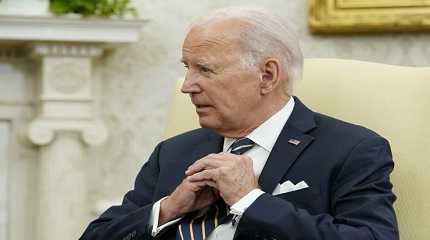
WASHINGTON, Oct 7 (Reuters) - U.S. President Joe Biden offered Israel on Saturday "all appropriate means of support" after a deadly attack from Palestinian militant group Hamas and warned "any other party hostile to Israel" not to seek advantage.
The attack from the Iran-backed Islamist group erupted amid efforts by Biden and his team to negotiate a landmark normalization agreement between foes Israel and Saudi Arabia and a U.S.-Saudi defense pact.
Biden spoke by phone to Israeli Prime Minister Benjamin Netanyahu on Saturday to offer U.S. support, with scenes of violence playing out on American news networks. The two leaders have had strained relations but met in New York last month in a show of solidarity.
"I made clear to Prime Minister Netanyahu that we stand ready to offer all appropriate means of support to the government and people of Israel," Biden said in a statement issued after their call.
Biden also issued a blunt warning.
"Israel has a right to defend itself and its people. The United States warns against any other party hostile to Israel seeking advantage in this situation," he said.
The violence came as Washington was in disarray: Republicans are looking for a successor to ousted Speaker Kevin McCarthy of the House of Representatives, and a budget showdown looms with Biden and his Democrats that could lead to a government shutdown in about 40 days.
Biden's choice to be U.S. ambassador to Israel, former Treasury Secretary Jack Lew, has yet to be confirmed by the U.S. Senate.
Biden was briefed early on Saturday about the events in Israel and White House officials worked through the night monitoring them, an official said.
IRAN CRITICISM
Republicans seeking to oust Biden in the 2024 presidential election were quick to criticize his handling of the situation.
"Iran has helped fund this war against Israel, and Joe Biden's policies that have gone easy on Iran has helped to fill their coffers. Israel is now paying the price for those policies," said Florida Governor Ron DeSantis, a Republican running for his party's presidential nomination.
DeSantis appeared to be referring to a prisoner swap deal the Biden administration arranged with Iran last month. Under the deal, the United States waived sanctions to allow the transfer of $6 billion in Iranian funds from South Korea to Qatar, a step needed to carry out the U.S.-Iran prisoner swap.
A Biden administration official said not a dollar of the $6 billion has been spent yet. The money is intended solely for humanitarian purposes.
"I can't comment on 2024 because of the Hatch Act. But I can clarify the facts: Not a single cent from these funds has been spent, and when it is spent, it can only be spent on things like food and medicine for the Iranian people," said White House National Security Council spokesperson Adriene Watson.
The Hatch Act prohibits White House officials from engaging in political activity.
The impact of the Hamas attack on the U.S.-Israel-Saudi normalization negotiations was unclear. White House Middle East envoy Brett McGurk was in Saudi Arabia a month ago talking to officials, including Palestinians, about normalization.
The United States has been insistent any agreement include some Israeli concessions to the Palestinians, but what those would be remained a subject of negotiations.
Reuters reported last month that Saudi Arabia is determined to secure a military pact requiring the United States to defend the kingdom in return for opening ties with Israel, and will not hold up a deal even if Israel does not offer major concessions to Palestinians in their bid for statehood.
Palestinian President Mahmoud Abbas has said any bargain must recognize the Palestinian right to a state within the 1967 borders, including East Jerusalem, and must stop Israeli settlement building.
Netanyahu has said Palestinians should not have a veto over any peacemaking deal.




